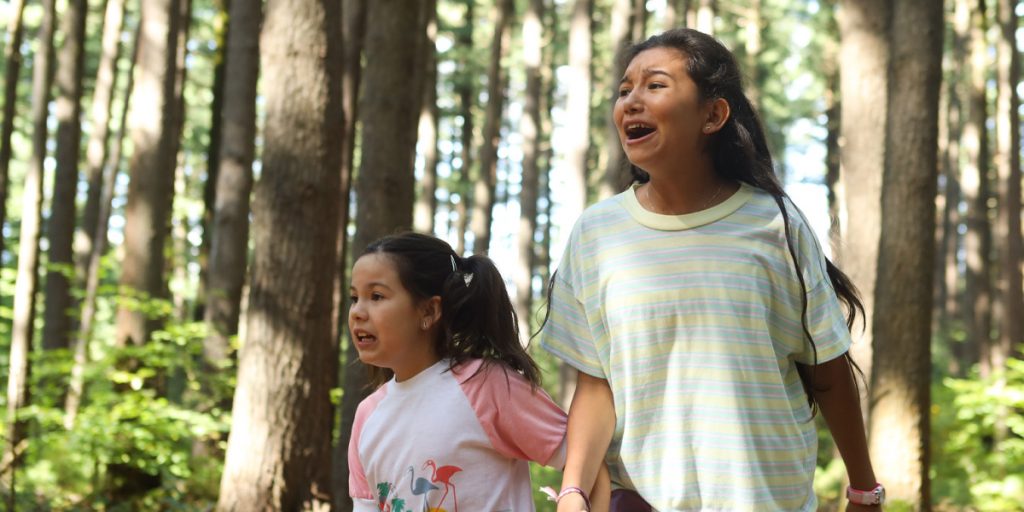Director Tracey Deer paves the way for indigenous filmmaking with Beans, a coming-of-age historical drama that raises many timely questions.
In one of the first scenes from Beans, our titular character drops the F-bomb for the first time in her life after a minor injury, marking a milestone in her road towards adolescence. In another scene, she sits, afraid, in a moving car that is being attacked by a group of rioters angered with her community, in a clear case of racism. These two scenes couldn’t feel more different from one another, but these examples are precisely what make Beans the unique drama that it is.
Beans follows an indigenous tween navigating girlhood, struggling to form her own identity during turbulent times. But this coming-of-age story is also set against the backdrop of the Oka Crisis, an event that rocked the city of Quebec for 78 days, in 1990, when the Mohawks and police officers engaged in an armed dispute about the expansion of a golf course on native grounds. Director Tracey Deer, who lived through the Oka crisis, interwove her experiences of youth into the film, giving a firsthand account of the conflict: Beans differs from previous films in the coming of age genre because it’s an indigenous story told by an indigenous filmmaker. In addition to its refreshing story of growing pains, the film takes a look at the 1990s land dispute that divided a city and ignited discrimination towards the Mohawk population, wisely commenting on how active racism is in today’s world.
The film follows 12-year-old Mohawk girl Tekehentahkwa (Kiawentiio) who goes by Beans for short. Aside from a mother (Rainbow Dickerson) who pressures her into applying to predominantly Caucasian prep schools, she also has trouble fitting in with the popular kids of her same ethnicity, who occupy themselves with drinking alcohol and playing kissing games. When the Oka crisis begins, resulting in the death of a police officer, the townies begin to generate hostility towards indigenous people. This includes prohibiting them to shop at their stores, or blocking their path to get home. These factors have an influence on Beans’ growth, as they make it more difficult for her to establish her individuality in the world, and she struggles to fit into both of her communities.

Beans takes a bold leap of faith trying to blend its coming of age elements with its revolutionary backdrop. Beans goes through the stages of rebellion you’d typically find in a coming of age drama, and we see her sipping on alcohol or making out with boys at parties. But the girl also witnesses the riots and terror that fall upon her family and friends during the Oka Crisis. Tracey Deer derives what she depicts from her own experiences, not only reliving her childhood but adding dramatized elements to make her message more effective.
There is some trouble when the film tries to balance out Beans’ transition into adolescence and the history lesson on the Oka Crisis, mostly because all the focus tends to lean more towards the former. As a result, the 1990s land dispute isn’t covered as extensively as it should have been, keeping in mind that the film sets off to shine a light on native injustices. As for the the coming of age elements, Beans explores thematics that would seem to be quite dark and surreal for a 12-year-old girl to experience, as the film shows an averted sexual assault and scenes of self-harm. However, Beans succeeds at shaping its protagonist’s identity, which is, after all, the most central element of the story.
Beans is far from being the greatest coming of age film ever made, but there is no doubt it is among the most special ones made in recent years. The director’s previous filmography includes documentaries on the Mohawks, but, with Beans, Deer presents a personal story that proudly embraces her roots and teaches about integrating yourself into society. The film documents how natives were mistreated by white and French Canadians during this unstable period, giving thought provoking ideas about the kind of racism these communities still endure, as well as what other minorities are facing all over the world. Beans is as universal as a story could get, and a landmark in indigenous cinema.
Beans (2021) is now available to watch on digital and on demand.

